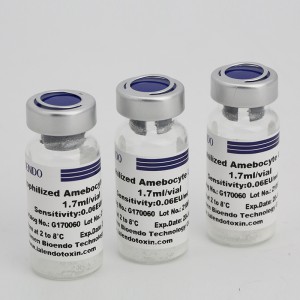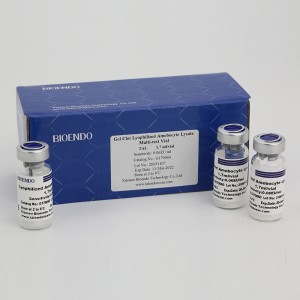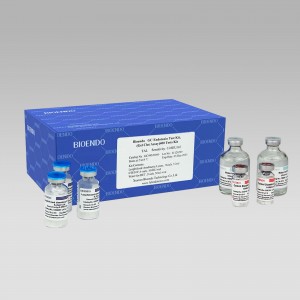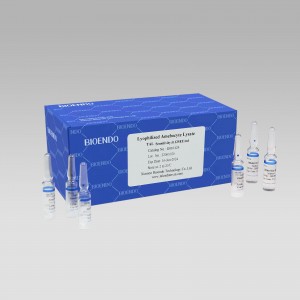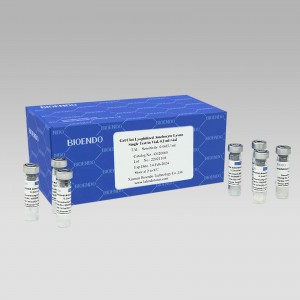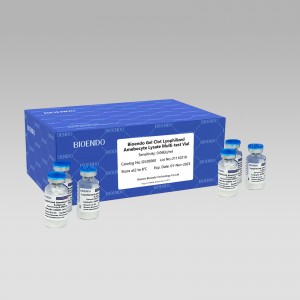Gel Clot Lyophilized Amebocyte Lysate Multi-test Vial G17
Gel Clot Lyophilized Amebocyte Lysate (LAL) Multi-test Vial, G17 series
1. Product Information
Gel Clot Lyophilized Amebocyte Lysate Multi-test Vial is the Lyophilized Amebocyte Lysate reagent which choose gel clot technique to detect endotoxin or pyrogen. As the widespread method, gel-clot test for endotoxin is simple and does not require specific and expensive instrument. Bioendo provides Gel Clot endotoxin assay kit in 1.7ml per vial.
2. Product Parameter
Sensitivity range: 0.03EU/ml, 0.06EU/ml, 0.125EU/ml, 0.25EU/ml, 0.5 EU/ml
3. Product Application
End-product endotoxin (pyrogen) qualification, water for injection endotoxin assay, raw material endotoxin testing or endotoxin level monitoring during manufacturing process for pharmaceutical companies or medical devices manufacturers.
Note: Lyophilized Amebocyte Lysate (LAL reagent) manufactured by Bioendo is made from lysate of amebocytes (white blood cells) from the horseshoe crab.
Gel clot method LAL assay, reconstituted lysate reagent get at least 16 tests per vial:
| Catalog Number | Sensitivity (EU/ml or IU/ml) | ml/vial | Tests/Vial | Vials/Pack |
| G170030 | 0.03 | 1.7 | 16 | 10 |
| G170060 | 0.06 | 1.7 | 16 | 10 |
| G170125 | 0.125 | 1.7 | 16 | 10 |
| G170250 | 0.25 | 1.7 | 16 | 10 |
| G170500 | 0.5 | 1.7 | 16 | 10 |
Product condition:
The Lyophilized Amebocyte Lysate reagent sensitivity and the Control Standard Endotoxin potency are assayed against USP Reference Standard Endotoxin. The Lyophilized Amebocyte reagent kits come with product instruction, Certificate of Analysis.
One of the key features of the Bioendo Lysate reagent G17 series that is its strong resistance to interference. This is especially important when working with large sample sizes, as there is a higher likelihood of potential interference from other substances present in the sample. The endotoxin detection process requires a high degree of sensitivity and specificity, and the Bioendo Lysate reagent has been specifically formulated to minimize the impact of interfering substances. This ensures that the endotoxin detection process is accurate and reliable, even when working with large sample sizes.
In addition to its resistance to interference, the Gel Clot Method Lyophilized Amebocyte Lysate Multi-test Vial G17 is also designed for ease of use. The lyophilized format of the reagent allows for long-term stability and easy storage, while the multi-test vial format enables convenient testing of multiple samples. This makes the Bioendo Lysate reagent a practical and cost-effective choice for endotoxin detection in large-scale applications, such as pharmaceutical manufacturing and medical device production. Overall, the Gel Clot LAL assay, using the Bioendo Lysate reagent, is a valuable tool for ensuring the safety and quality of products by detecting endotoxin contamination in large amounts.
Why the most microbiologists to select gel clot assay kit G17 series ?
1. LAL reagent G17 series is the most universal method to show the presence of endotoxins based on if gel formation in the sample tube when operate the bacterial endotoxin test.
2. Multi limulus lysate test for endotoxin detection in the parenteral drugs, when detect the moderate quantity samples.
3. LAL test procedure of incubation, the convenient device is water bath or dry heat incubator.
4. High end quality of endotoxin free tube (<0.005EU/ml) and High quality of pyrogen free tip (<0.005EU/ml) as the guaranteed consumables to ensure the correct result.
Related products in the endotoxin test assay:
- Water for Bacterial Endotoxins Test (BET), Recommend TRW50 or TRW100
- Endotoxin free glass tube ( dilution tube ), Recommend T1310018 and T107540
- Pyrogen free tips, Recommend PT25096 or PT100096
- Pipettor, Recommend PSB0220
- Test Tube Rack
- Incubation Instrument (Water Bath or Dry Heat Incubator ), Recommend Dry Heat Incubator TAL-M2
- Vortex Mixter, Recommend VXH.
- Control Standard Endotoxin, CSE10V.
Bioendo LAL test for pyrogens or LAL assay endotoxin, and TAL test, all descriptions are belong to the endotoxin test.
Base on Bioendo processing art, the kits are lyophilized amebocyte lysate (LAL).
Limulus amebocyte lysate (LAL) is an aqueous extract of blood cells (amoebocytes) from the Atlantic horseshoe crab Limulus polyphemus. LAL reacts with bacterial endotoxin lipopolysaccharide (LPS), which is a membrane component of gram-negative bacteria. This reaction is the basis of the LAL test, which is widely used for the detection and quantification of bacterial endotoxins.
In Asia, a similar Tachypleus amebocyte lysate (TAL) test based on the local horseshoe crabs Tachypleus gigas or Tachypleus tridentatus is occasionally used instead. The recombinant factor C (rFC) assay is a replacement of LAL/TAL based on a similar reaction.



